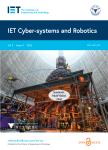Extreme learning-based non-linear model predictive controller for an autonomous underwater vehicle:simulation and experimental results
作者机构:Department of Electrical EngineeringNational Institute of Technology RourkelaRourkela 769008India School of Electrical SciencesIndian Institute of Technology GoaPondaGoa-401403India
出 版 物:《IET Cyber-Systems and Robotics》 (智能系统与机器人(英文))
年 卷 期:2019年第1卷第2期
页 面:45-54页
核心收录:
学科分类:08[工学] 081101[工学-控制理论与控制工程] 0811[工学-控制科学与工程] 081102[工学-检测技术与自动化装置]
主 题:Extreme underwater autonomous
摘 要:In this study,an extreme learning-based non-linear model predictive controller(NMPC)is proposed for path following planning of an autonomous underwater vehicle(AUV)using horizontal *** proposed controller comprises a kinematic controller and a dynamic *** kinematic controller is designed by using back-stepping approach whilst the dynamic controller is designed by employing the NMPC *** dynamics of the AUV is identified in real-time by employing an extreme learning machine(ELM)*** view of achieving improved performance of the ELM structure,its hidden layer parameters are optimally determined by applying Jaya optimisation *** resulting ELM model is then used to design a NMPC considering the constraint on rudder *** tracking performance of the proposed controller is compared with that of two recently reported control algorithms namely,H∞state feedback controller and inverse optimal self-tuning proportional-integral-derivative(PID)*** proposed controller is implemented using MATLAB and then in real-time on a prototype AUV developed in the authors’*** both the simulation and experimental results obtained,it is observed that the proposed controller exhibits superior tracking performance compared to both H∞state feedback controller and inverse optimal self-tuning PID controller.



